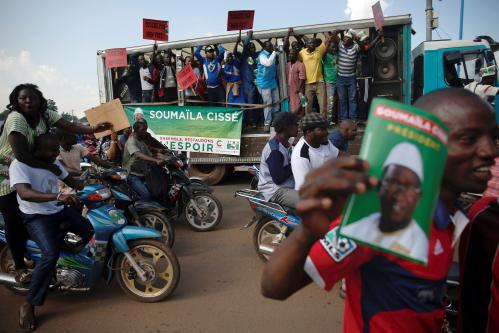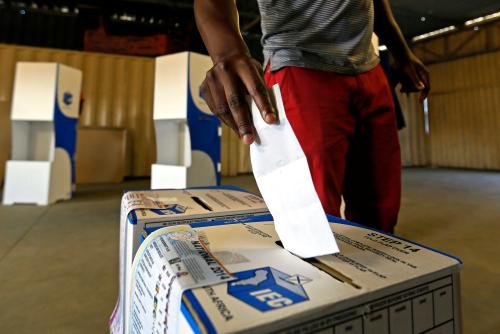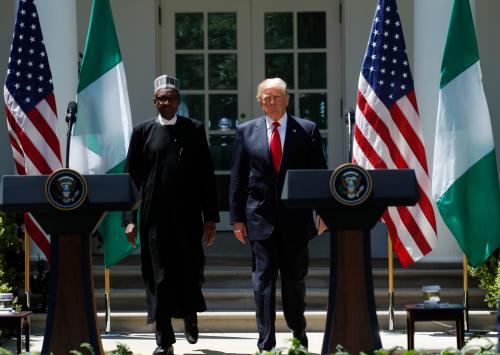Opposition members obstruct Zuma’s State of the Nation address
South African President Jacob Zuma presented his annual State of the Nation address to members of parliament in Cape Town on Thursday, February 9, amid protests in and outside of the National Assembly. For this year’s address, Zuma authorized the deployment of 440 soldiers in addition to the 6,000 police officers to maintain “law and order” outside parliament during the speech, which the main opposition party, the Democratic Alliance (DA), called “a security-state show of force, meant to intimidate opposition both inside and outside the ANC” in a statement. Much like during last year’s speech, the Economic Freedom Fighters (EFF) opposition party interrupted the proceedings, delaying the address by nearly an hour before security teams removed them from the building. The DA walked out in protest of the EFF’s expulsion.
Meanwhile, Zuma’s speech focused on policies to address the country’s economic challenges, including its slow economic growth reaching just 0.4 percent in 2016, high unemployment of 27.1 percent, and concerns regarding its investment-grade credit rating status. While he aimed to reassure lawmakers and the public of the government’s commitment to reducing inequality, growing dissatisfaction with Zuma’s leadership—from the opposition, electorate, and even his own ruling party—is evident, the BBC, VOA, and Reuters report. Opposition members have attempted to impeach him five times since he became president in 2009, following a series of scandals. Meanwhile his ruling African National Congress party suffered its biggest electoral defeat since the 1994 post-apartheid election in the 2016 local elections, losing Johannesburg and Pretoria to a coalition of opposition parties. While Zuma will step down as head of the ANC in December 2017, he will continue to serve as president through 2019. ANC leaders are already vying for the top position as the party plans for succession.
Nigeria questions President Buhari’s health status while protests on economy erupt
This week, concerns over Nigerian President Muhammadu Buhari’s health intensified. The president, on leave since January 23 and currently in the United Kingdom, submitted a letter to his national assembly on February 5 informing them of the indefinite extension of his medical leave. In his absence, Vice President Osinbajo exercises presidential powers. The president did not provide a timeline for his return, but his spokesperson told Reuters that the president was not suffering from any serious medical conditions. The office added that Buhari is extending “his leave in order to complete and receive the results from a series of tests recommended by his doctors.” Nigerians are particularly worried about the situation because of its parallels to November 2009, when then-President Umaru Yar’Adua went on an extended medical leave without informing the Nigerian public. In February 2010, the senate eventually swore in Vice President Jonathan as acting president, who then became Nigeria’s permanent president when President Yar’Adua died in April 2010.
In other news, on Monday, Nigerians took to the streets to protest the country’s governance and macroeconomic issues, as the country is undergoing its first recession in 25 years, and inflation has driven up the costs of basic products (e.g., meat, bread, fish.) The protests attracted more than 500 demonstrators. The critics notably directed their complaints at the Buhari administration, stating that he has made little progress on his electoral promises of fighting corruption, diversifying the oil-dependent economy, and ending the Boko Haram insurgency. Vice President Osinbajo responded, via social media, by stating that the demonstrators were heard “loud and clear” and that, “years of deterioration cannot be reversed overnight.”
Later this month, the country is set to publish its economic blueprint for the next four years, with the aim of lifting the country’s economy and boosting the annual economic growth rate to 7 percent by 2020.
Somalia’s new president, the first new one in decades, comes in with hope amid serious challenges
On Wednesday, Somalia’s parliament—amid a lockdown in Mogadishu and in a secured aircraft hangar—voted for its first new president in decades. After two rounds of voting, former Prime Minister Mohamed Abdullahi Mohamed surprisingly came out on top of incumbent President Hassan Sheikh Mohamud. Though the election was peaceful and largely celebrated, to some the results are controversial: Many allegations of vote buying exist. In fact, before the election, anti-corruption group Marqaati stated, “This is probably the most expensive election, per vote, in history.”
The new president—who holds dual U.S.-Somali citizenship and is nicknamed “Farmajo” or “Mr. Cheese”—has a long road ahead of him. Security problems largely caused by al-Shabaab continue to create terror and instability throughout the country. The federal government itself holds little sway over the country’s various states. Divisions among clans, sub-clans, and sub-sub-clans make governing extremely difficult. The federal government also collects very little revenue—mostly from the port and the airport in the capital. Corruption is rampant. After the election, though, citizens flooded the streets in celebration, and news reports cite feelings of joy and hope for the country going forward.
In other election news, on February 3, Chad announced it would yet again be postponing its legislative elections. Originally scheduled for 2015, the elections have been delayed again due to a lack of funds caused by low oil prices, according to President Idriss Déby.
The Brookings Institution is committed to quality, independence, and impact.
We are supported by a diverse array of funders. In line with our values and policies, each Brookings publication represents the sole views of its author(s).








Commentary
Africa in the news: Zuma delivers South Africa’s State of the Nation, Nigerians probe leader’s health, and Somalia votes
February 10, 2017